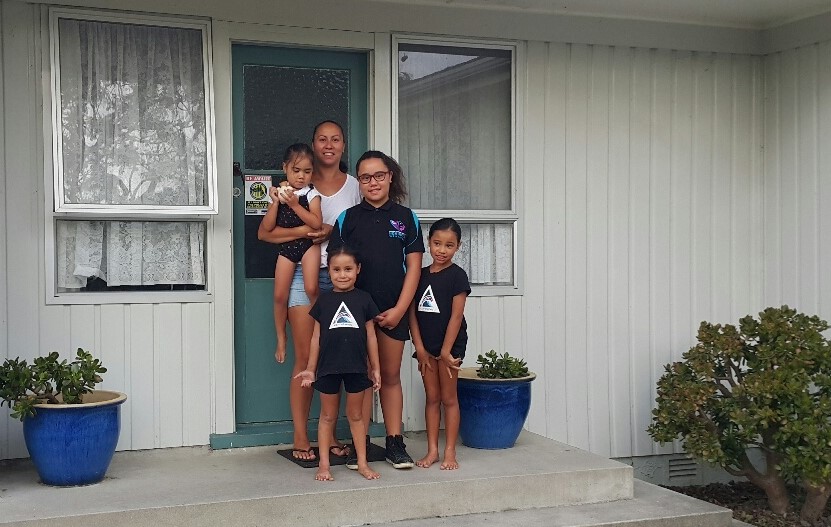Case Study_Monte Cecilia_FINAL

Their housing services include tenancy advice, social and emergency housing, home ownership workshops, advice and support.
The Gisborne region has some very real housing issues. Dr Kate Amore’s research on housing deprivation show’s that Gisborne has one of the highest rates of housing deprivation in the country (Amore, 2016; p18)[1]. Statistics NZ figures show the Gisborne region currently has the highest percentage of households in New Zealand who do not own their home at 40.8 % and only 28% of Māori own their own home in the region. [2]
TRONPnui have built seven new homes for social housing through the previous Housing Innovation Fund and working closely with marae in their area they want to build on the communally owned land so that the homes will be there for future generations. However, finding finance has proven difficult and ten marae are currently waiting for new homes to be built.

|
Bella Paenga and her whanau bought their HNZ home in Tiki Tiki a year ago, “it’s a safe place to call home and not many homes come up for sale here |
In the last couple of years they’ve helped around 10 tenants purchase the homes they were renting from Housing New Zealand (HNZ) and they plan to help more this year. Most HNZ properties within Ngāti Porou are covered by right of first refusal (RFR) provisions under the Ngāti Porou Settlement Act. Therefore, any tenants within Ngāti Porou who want to purchase their Housing NZ properties require a waiver from TRONPnui. The rūnanga provides waivers to Ngāti Porou whānui, subject to certain conditions.
Anne Huriwai, says a big part of what they do is home ownership education. High debt and affordability issues have meant home ownership is difficult for many families and they’ve been trying to get government to change policies around debt. Anne says that through the Low Deposit Rural Lending scheme once bad debt had been paid off the slate was wiped clean enabling potential borrowers to borrow immediately. But now ‘normal’ lending criteria applies putting homeownership out of reach for many whanau. Because of their work in this area TRONPnui have successfully intervened to prevent 30 potential mortgagee sales.
Bella Paenga bought her HNZ house in Tiki Tiki after a long, five year process. Getting finance was the difficult part. She says having Kiwisaver and a subsidy from HNZ helped but, because of limited income, the banks wouldn’t lend the remainder. “I would still be renting if it wasn’t for Hine encouraging me to keep going,” Bella says. Finance was eventually gained through the credit union and Bella is glad they kept going with the process “it’s given us a safe place that’s ours that we can call home. We’re in a stronger position for the future now we aren’t paying rent and we have an asset for our children and grandchildren.”
TRONPnui recently contracted with MSD to provide support services for people in emergency housing and are exploring options with HNZ to help meet the growing social housing demand in Gisborne. Home maintenance is another high need and while there are grants to help with this,TRONPnui are careful not to raise expectation as the pūtea available through the Maori Housing fund is limited. Because of this they target funds to those most in need, such as pakeke (elderly) and whanau/families where the children have respiratory issues or other long term conditions.

|
For Kararaina Lawson of Gisborne having her own home means security and no longer having to deal with HNZ |
Another previous HNZ tenant and now home owner, is Christine. She was one of the first people to go through the process of buying her HNZ home with support from Hine. “At the beginning Housing New Zealand told me the house wasn’t available as it had been offered to the rūnanga, that’s when I came into contact with Hine. She helped me get the waiver from Ngāti Porou so I could buy the house.”
That took her about a year and then it was another four years getting through the process of buying the property off HNZ. The purchase price kept increasing as a new valuation would be needed every three months while HNZ deliberated. “If they had sorted it at the beginning it would have cost me $20,000 less. But because it took five years it eventually cost me a lot more plus multiple bills for valuations and legal fees.
I would never have got through this without Hine, though. She helped me deal with the lawyers, the banks and HNZ. I nearly gave up – five price changes along the way – but this is our family home. I’ve lived here for 22 years and Mum and Dad were in the house for 20 years before that. Now I think yay – at last we have a house where they aren’t threatening to kick me out every year.”
You can contact Hine Manuel at Te Rūnanganui o Ngāti Porou on 0800 833 502 or email: [email protected]if you are a Housing New Zealand tenant interested in purchasing your Housing New Zealand home or would like to enquire further about their housing services.
Download the article here:
[1] Amore K. (2016). Severe housing deprivation in Aotearoa/New Zealand: 2001-2013. He Kainga Oranga/Housing & Health Research Programme, University of Otago, Wellington.
[2] Statistics New Zealand (2016). Changes in home-ownership patterns 1986–2013: Focus on Māori and Pacific people. Available from www.stats.govt.nz; p.7
CHA Newsletter - 9 February 2026
Media Release_Opposition to Move On Powers, Te Matapihi & CHA call for Housing Led Action to Address Homelessness
CHA Submission - Stats NZ Census changes